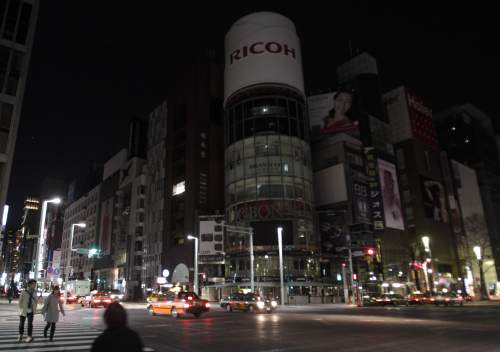It’s business as usual for Korea as foreign firms flee Japan
It looks like Korean firms will be holding the fort in Japan as a growing number of foreign companies appear to be withdrawing employees and their families over the nuclear radiation scare.
Most Korean firms have decided to stick with Japan based on research and testimonies from their Japanese offices that the situation is stable in Tokyo, where most of their employees and families reside.
“Our decision is to stay, although we will be watching the situation closely for danger signs,” LG Corp. said, explaining its decision against pulling out any of its 300 or so workers in Japan.
The situation is the same with Samsung Group, which has said it would not be getting anyone out of Japan when there were more than 1,000 Japanese workers employed at Samsung’s Japanese operations. POSCO, the nation’s leading steelmaker, also has no plans to withdraw workers, although it has said family members can return if they wish.
A few Korean companies have pulled out the families of their employees in Japan, but their workforces there were quite small to start with, being a few people at most.
Others relocated employees in the more dangerous areas, such as near Sendai of Miyagi Prefecture, to safer regions such as Tokyo, companies said.
Despite assurances from experts, concerns linger about the possibility of being exposed to radioactive materials should the nuclear plant in Fukushima continue to malfunction and experience more explosions.
“It could be a cultural issue, because we seem to have different priorities,” said one industry source who declined to be identified. “Koreans also of course consider families and lives as important, but at the same time we can’t imagine letting go of our work or business.”
BMW, as The Korea Herald earlier reported, has sent 50 of its Japan-based workers and their family members back to their homes in Germany. Five of the firm’s Japanese operations, including the firm’s chief and Chief Financial Officer, have moved temporarily to Korea until the situation improves.
Firms such as Ericsson and Maersk, both based in Europe, also are pulling their employees and families out. Maersk has shut down all of its six offices in Japan as well.
The employees and their families have relocated to Singapore for the time being, sources said.
A number of U.S or Europe-based banks and equity funds also are reportedly departing Japan, citing fears of nuclear contamination.
“There definitely were long lines of foreign nationals from the west who were waiting to catch flights out of Japan,” said Choi Hee-suk, The Korea Herald correspondent who was dispatched to Tokyo this week.
Choi added that the city of Tokyo had not been affected too much by the quake or the tsunami, and that it was business as usual.
The flight of non-Japanese gave an unexpected leg-up to the local hotel industry, with some hotels experiencing a surge of guests coming in from Japan.
Ambassador Hotel on Thursday rented out about 120 rooms to about 160 guests who were family members of employees of firms or embassies in Japan.
About 40 more were expected to come in on Friday, according to Park In-sun, a spokeswoman for the hotel.
She said the guests were scheduled to check out today, but have said their itinerary remains flexible.
By Kim Ji-hyun (jemmie@heraldcorp.com)
 |
A couple cross a large intersection in front of blacked out light displays at Tokyo's Ginza district Thursday, March 17, 2011. In the famous shopping mecca - and elsewhere in the nation's capital - public apprehension over a brewing nuclear disaster is draining the streets and stores of the crowds that normally define this dynamic, densely packed city. (AP-Yonhap News) |